高一英语上学期教案Unit 2 English around the world Reading
教学设计15:Unit 2 English around the world

Unit 2 English around the world说课稿各位老师:大家好!我今天所说的课题是高中一年级英语上册第2单元English around the world。
我说课的内容包括五部分,包括教材分析,学生分析,教学方法,教学过程和板书设计。
一、教材分析1.教材内容分析今天我说课的内容是高一英语必修1第一单元English around the world.,本单元讨论的话题是“世界英语”介绍了英语在当今世界范围内人们生活中扮演的不同角色及其重要意义。
尤其介绍了英美语言的差异,让学生更进一步了解学好英语的必要性和其重要意义。
促使学生了解英美语言在词汇、拼写、语音等方面的区别。
使学生在认识到学好英语的重要性的同时,更加热爱自己的祖国,从而培养他们的祖国意识。
2、教学目标分析新课标提出了立体三维教学目标,本课我设计的教学目标如下:1)知识目标:熟悉本课的一些新单词,短语和句型。
语法方面掌握直接引语和间接引语的用法及其之间的转换,包括其中的请求与命令的用法。
2)能力目标:训练学生的阅读技巧(略读、寻读等),形成用英语获取信息、处理分析信息的能力。
并鼓励学生开口说英语。
3)情感态度目标:①通过学习激发学生对英语学习的浓厚兴趣;②使学生在领会语言丰富多彩性的同时更加热爱自己的祖国,从而培养他们的祖国意识。
培养他们的跨国文化意识和世界意识。
③通过对课文学习的小组讨论等形式,帮助学生养成团结、协作的品质。
3、教学重点、难点:1)教学重点:①让学生熟悉与本话题相关的一些重点单词、短语。
②提高学生的阅读能力,掌握多种阅读方法,如寻读,精读,理解等。
2)教学难点:对阅读中所获取的信息进行加工学习,形成有效的学习策略。
鼓励学生开口说英语。
二、学生分析高一年级的学生已经在初中阶段的英语学习中,已经积累了一定的词汇基础,并掌握了一些简单的学习策略和技巧,具有初步的英语听说读写能力。
但学生的英语水平参差不齐,教学既要进一步培养尖子的学习能力又要保证能力稍弱的学生能听懂,调动他们的积极性,使他们愿意学,在学习的过程中享受到乐趣。
4.高一英语(人教新课标)Unit-2-English-Around-the-World教案!

4.高一英语(人教新课标)Unit-2-English-Around-th e-World教案!Unit 2 English Around the World编稿:李皓然审稿:杨淑燕责编:杭海目标认知重点词汇even if come up in the way presentrecognizebecause of more than command base重点句型However, they may not be able to understand everything.语法直接引语变间接引语精讲巧练1. even if【原句回放】Native English speaker can understand each other even if they don't speak the same kind of English.去时;若从句动作发生在主句动作之前,则从句用过去完成时。
如:They talked as if they had been friends for many years.他们谈话亲热,就像交往多年的朋友似的。
It seems as if it was/were summer already.现在仿佛已经是夏天似的。
随时练1. ___________you don’t like wine, trya glass of this, which is from France.A. Even thoughB.If C. Asif D. Unless2. There was never any time for Kate to feel lonely, ______ she was an only child.A. ever sinceB. now thatC. even thoughD. even as【解析】1. 即使你不喜欢喝酒,尝尝这杯法国的酒吧。
2. 本题考查从属连词的用法区别。
(完整word版)高中英语高一人教版必修一-unit2 English around the world教案、教学设计
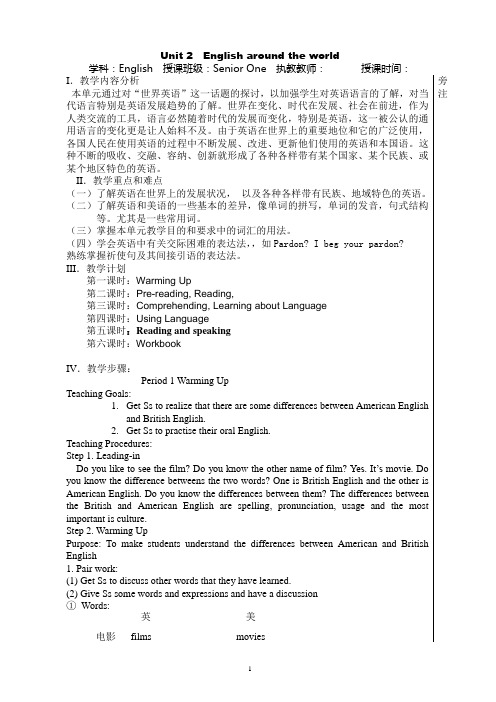
Unit 2 English around the world学科:English 授课班级:Senior One 执教教师:授课时间:I.教学内容分析本单元通过对“世界英语”这一话题的探讨,以加强学生对英语语言的了解,对当代语言特别是英语发展趋势的了解。
世界在变化、时代在发展、社会在前进,作为人类交流的工具,语言必然随着时代的发展而变化,特别是英语,这一被公认的通用语言的变化更是让人始料不及。
由于英语在世界上的重要地位和它的广泛使用,各国人民在使用英语的过程中不断发展、改进、更新他们使用的英语和本国语。
这种不断的吸收、交融、容纳、创新就形成了各种各样带有某个国家、某个民族、或某个地区特色的英语。
II.教学重点和难点(一)了解英语在世界上的发展状况,以及各种各样带有民族、地域特色的英语。
(二)了解英语和美语的一些基本的差异,像单词的拼写,单词的发音,句式结构等。
尤其是一些常用词。
(三)掌握本单元教学目的和要求中的词汇的用法。
(四)学会英语中有关交际困难的表达法,,如Pardon? I beg your pardon?熟练掌握祈使句及其间接引语的表达法。
III.教学计划第一课时:Warming Up第二课时:Pre-reading, Reading,第三课时:Comprehending, Learning about Language第四课时:Using Language第五课时:Reading and speaking第六课时:WorkbookIV.教学步骤:Period 1 Warming UpTeaching Goals:1.Get Ss to realize that there are some differences between American Englishand British English.2.Get Ss to practise their oral English.Teaching Procedures:Step 1. Leading-inDo you like to see the film? Do you know the other name of film? Yes. It’s movie. Do you know the difference betweens the two words? One is British English and the other is American English. Do you know the differences between them? The differences between the British and American English are spelling, pronunciation, usage and the most important is culture.Step 2. Warming UpPurpose: To make students understand the differences between American and British English1. Pair work:(1) Get Ss to discuss other words that they have learned.(2) Give Ss some words and expressions and have a discussion①Words:英美电影films movies 旁注汽油petrol gas, gasoline图钉drawing thumb tack钞票banknote bill跳远long jump broad jump糖果sweets candy(1)Divide Ss into groups and ask them to make a dialogue.(2)Let Ss practice the dialogue with their partners.Periods 2 Pre-reading and ReadingTeaching Goals:1.Get Ss to learn about English spoken around the world2.Improve Ss’ reading ability, especially the skills of summarizing, word guessing andscanning.3.Get Ss to realize the importance of learning English and of love of our own country.4.Encourage Ss to think and talk in English through communicative tasks and provideSs with chances of cooperation.Teaching Procedures:Step 1. Leading-inPresent Ss with the names of seven countries (the UK, the USA, Canada, Australia, South Africa, Ireland and New Zealand), and ask S s: “Is there any relationship b etween these 7 countries?” Allow Ss to show their own opinions. The answer is that English is the mother tongue to the people in these 7 countries.1.Present Ss with the names of some other countries: India, Pakistan, Nigeria and thePhilippines. Then ask: “Is English spoken in these countries?” Allow Ss to show their own opinions. English is used as an official language in these countries, which is spoken on formal occasions like governing, schooling and news reporting.2.Also in many countries, English is learned as a foreign language, like in China, Japan,France and so on. So although English doesn’t have the most speakers in the world, it is the most popular language all over the world. Today we’re going to read a lesson entitled English around the world.Step 2. Reading1.Skimming:Get Ss to read through the passage and find the topic sentence of each paragraph.Para 1 Today, more people speak English as their first, second or foreign language than ever before.Para 2 Native English speakers can understand each other even if they don’t speak the same kind of English.Para 3 All languages change when cultures communicate with one another.Para 4 English is also spoken as a foreign or second language in South Asia.2. ScanningPurpose: To get Ss to have some details in the text.Read the text quickly and try to get some details from the text. Work in pairs and try to ask and answer questions from the text. Questions can be like these.Q1. How many people spoke English at the end of the 16th century? Where did they live?Q2. Why is English to be spoken in many other countries in the next century?Q3. Which country has the largest number of English speakers?Q4. Why has English changed over time?Q5. Why does India have a very large number of English speakers?Suggested answers:A1. At the end of the 16th century, about five to seven million people spoke English.A2. In the next century, people from England started moving to other parts of the world,so English began to be spoken in many other countries.A3. China may have the largest number of English speakers.A4.Because all languages change when cultures communicate with one another.A5.India has a very large number of English speakers. This is because Britain ruled India from 1765 to 1947.3.Careful reading:Get Ss to read the passage carefully again and meanwhile try to guess the meaning of the following words or phrases: even if, come up, actually, play a role, vocabulary, usage, identity , government.even if=even though: in spite of the fact; no matter whetherplay a role: to be involved in an activityactually: really; in factvocabulary: all the words and phrases you learnsuch as: for exampleelevator: a machine used for moving people or things up and down4.After reading:Allow Ss to discuss with their partners the meaning of the new words. Then let some Ss explain the words. The teacher can give some further explanations if necessary.5.Answer these questions.(1) Do you think what kind of English you learn matters? Why?(2) Why do you think people all over the world want to learn English?(3) Give Ss chances to ask each other questions on the passage.6. Read the passage and choose the correct answer⑴English has /had the most speakers _______.A. now B, when the British ruled many parts of the worldC. in the time of ShakespeareD. in the 12th century .⑵Which of the following sentence is true?A Language always stay the same B. Language change only after warsC .Language no longer changeD .Language change when cultures change⑶From AD450 to 1150,English sounded more like ______.A . French B. ChineseC. GermanD. Russian⑷Shakepeare’s English was spoken around_______.A. 1400’sB. 1150’sC .450’s D. 1600’s⑸Which country has the fastest growing number of English speakers in the world ?A. Australia B ChinaC. IndiaD. BritainSuggested Answers: (1) A (2) D (3) C (4) D (5) BStep 3. Discussion1.After reading the passage, we’ve learned so much about English spoken around theworld. Do you think it’s necessary to have a good knowledge of English? Why do you think so? Please form groups of four and discuss these questions with your partners.(The teacher should walk around to provide any necessary help.)2.Give the students chances to express their opinions freely.3.Summary by the teacher:Through learning this passage, we have got to know that English is becoming more and more popular all over the world now. So English learning seems important to everyone, especially us students of the new century. With China’s entry into WTO, English will play a more important part in business, in tourism, and even in people’s daily life. So it’s no doubt that everyone should have a good knowledge of English. And I hope every one in our class can make an effort to learn English well. But on the other hand, it does n’t mean English is better than Chinese just as some students said just now. We must keep it in mind that one’s mother tongue is the most beautiful language in the world. The reason why we learn English is that we should thus be more capable of building up our country(It’s a good chance to lead the students to love our own country as well as to learn English well.)Step 4. Words and expressions1. Native English speakers can understand each other even if they do n’t speak the same kind of English .以英语作为母语的人,即使他们讲的英语不尽相同,也可以相互交流。
高一英语Unit2Englisharoundtheworld教案(通用2篇)
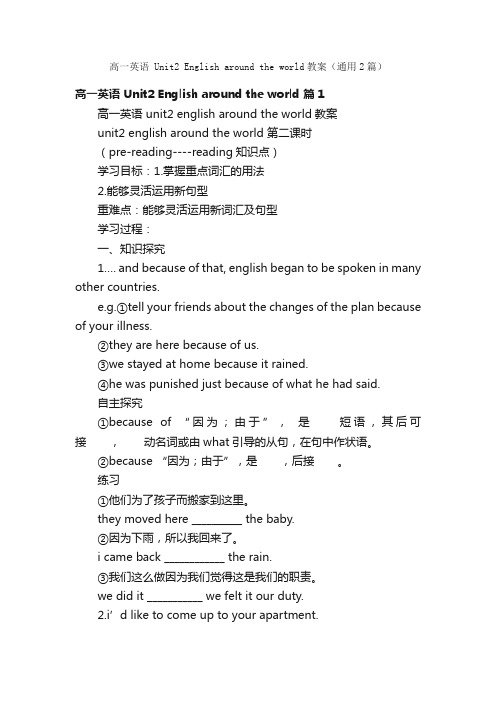
高一英语 Unit2 English around the world教案(通用2篇)高一英语 Unit2 English around the world 篇1高一英语 unit2 english around the world教案unit2 english around the world 第二课时(pre-reading----reading知识点)学习目标:1.掌握重点词汇的用法2.能够灵活运用新句型重难点:能够灵活运用新词汇及句型学习过程:一、知识探究1…. and because of that, english began to be spoken in many other countries.e.g.①tell your friends about the changes of the plan because of your illness.②they are here because of us.③we staye d at home because it rained.④he was punished just because of what he had said.自主探究①because of “因为;由于”,是短语,其后可接,动名词或由what引导的从句,在句中作状语。
②because “因为;由于”,是,后接。
练习①他们为了孩子而搬家到这里。
they moved here __________ the baby.②因为下雨,所以我回来了。
i came back ____________ the rain.③我们这么做因为我们觉得这是我们的职责。
we did it ___________ we felt it our duty.2.i’d like to come up to your apartment.猜测下列句子中come up 的词义。
①the little by came up to the stranger and showed him how to get to the police station.②we won’t forget the day when we watched the sun come up on top of the tai mountain.③it is certain that the question will come up at the meeting.④the snowdrops are just beginning to come up. _⑤i am afraid something urgent has come up. ____短语归纳come 邂逅come 向…扑来,攻击 come 来自 come 出版;开花;结果是come 想出,发现,提出come 发生come 绕道而来 come 落下,塌下指点迷津come up /come up with①come up 意为“被提及”时,其主语是被提出的内容,不能用于被动语态。
高一英语必修二教案《Unit 2 English around the world》

高一英语必修二教案《Unit 2 English around theworld》自己整理的高一英语必修二教案《Unit 2 English around the world》相关文档,希望能对大家有所帮助,谢谢阅读!教案【一】教学准备教学目标单词基地,命令,请求,识别表达式因为,出现,目前,利用,例如,起作用模式……正因为如此,许多其他国家开始说英语。
事实上所有的语言都在变化和发展…后者给了美国英语拼写一个独立的身份。
教学重难点帮助学生了解英语发展帮助学生更好地理解”学习英语”帮助学生理解和使用一些重要的单词和表达方式帮助学生识别间接引语的例子(二):请求文本中的命令教学工具课件教学过程挂牌热身同学们,早上好。
我们学英语已经好几年了。
但是世界上有多少英语国家呢?现在让我们在黑板上列出它们。
英语国家解释英国的母语美利坚合众国加拿大澳大利亚南非爱尔兰新西兰这些国家的人都以英语为母语。
总的来说,超过3.75亿人的母语是英语。
第二语言印度巴基斯坦尼日利亚菲律宾这些人在家里说他们自己国家的语言,但是政府、学校、报纸和电视的语言是英语。
外语中国德国法国等等。
把英语作为外语学习的人数超过7.5亿。
通过回答关于英语的问题来热身同学们,早上好。
今天我们将开始在世界各地学习第二单元英语。
但是你对英语了解多少?什么是标准英语?标准英语是大多数英国人使用的英语形式,并不限于一个地区或一群人。
什么是方言?方言是仅在一个地区使用的语言的变体,其中的单词或语法与同一语言的其他形式略有不同。
我们有标准中文吗?这是什么?在中国有如此多的方言,以至于政府鼓励全国人民说普通话,这被认为是标准的汉语。
通过给出理由来热身第二单元世界各地的英语是我们今天要学的。
我们现在都在学英语,因为英语在世界上很受欢迎。
但是你知道为什么会这样吗?对于英语在世界范围内的传播,你能给出多少个理由?*英语是奥林匹克运动会和联合国的官方语言之一。
*英语主导着国际网站,几乎提供了所有新的计算机术语。
人教高中英语必修一:Unit+2+English+Around+the+World教学设计.doc
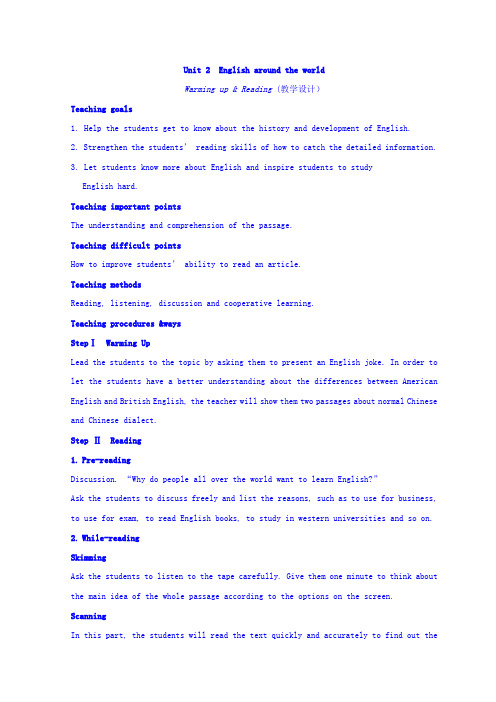
Unit 2 English around the worldWarming up & Reading (教学设计)Teaching goals1. Help the students get to know about the history and development of English.2. Strengthen the students’ reading skills of how to catch the detailed information.3. Let students know more about English and inspire students to studyEnglish hard.Teaching important pointsThe understanding and comprehension of the passage.Teaching difficult pointsHow to improve students’ ability to read an article.Teaching methodsReading, listening, discussion and cooperative learning.Teaching procedures &waysStepⅠ Warming UpLead the students to the topic by asking them to present an English joke. In order to let the students have a better understanding about the differences between American English and British English, the teacher will show them two passages about normal Chinese and Chinese dialect.Step Ⅱ Reading1.Pre-readingDiscussion. “Why do people all over the world want to learn English?”Ask the students to discuss freely and list the reasons, such as to use for business, to use for exam, to read English books, to study in western universities and so on.2.While-readingSkimmingAsk the students to listen to the tape carefully. Give them one minute to think about the main idea of the whole passage according to the options on the screen.ScanningIn this part, the students will read the text quickly and accurately to find out thetopic sentence of each paragraph and get the general idea of each parts.Detailed readingFor this part, students could search and catch the detailed information of each part through finishing some tasks about the text.3.Post-readingAfter grasping the details of the parts, ask students to accomplish another task, then retell the text by filling the blanks.Step Ⅲ DiscussionTopic: As we all know, more and more people all over the world now want to learn Chinese. Do you think Chinese will become an international language in the near future? Why or why not? Please list some reasons.Step Ⅳ Homework1. Read the text once again, discover some useful words and phrases, and underline them.2. Finish the Ex. on P11.精美句子1、善思则能“从无字句处读书”。
高一英语上册全册教案unit_2_English_around_the_world

Unit 2 English around the world一.学习目标和要求1. 掌握以下单词和习惯用语1)单词Nancy; bathroom; towel; landlady; closet; Karen;pronounce; Thompson; broad; repeat; Dave; ketchup;majority; native; total; tongue; equal; government;situation; Pakistan; Nigeria; the Philippines;international; organization; trade; tourism ;global;communicate; communication; exchange; service; signal;movement; peg; commander; tidy; stand independent;fall; expression; tornado; Spanish; southern;statement; president; European; Florida; howl;cookbook2)习惯用语make yourself at home; forget to do sth; in total2. 功能意念项目了解并掌握美式英语和英式英语的区别。
3. 语法1) 学习直接引语和间接引语(2)。
2) 学习ask/tell sb. to do sth结构。
4.语言运用运用所学语言,围绕英语学习这一话题,完成教材和练习册中的听、说、写的各项任务;阅读课文“English around theworld”并联系生活中的实际进行书写练习。
二.学习指导1.单词和习惯用语的用法1)flight n.[C]飞行;航班Did you have a good flight?你乘飞机一路愉快吗?They made a successful flight across the ocean.他们成功地飞越了这个大洋。
高一英语 Unit2 English around the world教案(通用2篇)

高一英语Unit2 English around the world教案(通用2篇)高一英语 Unit2 English around the world教案篇1高一英语 Unit2 English around the world教案篇2高一英语unit2 english around the world教案自助式复习板块学问搜寻a. 单词1.发音(v.)_____________2.宽的 (adj.)______________3.毛巾 (n.)____________4.多数 (n.)_____________5.本国的 (adj.)_______________6.舌头 (n.)____________7.相等的 (adj.)_______________8.政府 (n.)____________9.国际的 (adj.)_______________10.情景 (n.)____________11.表情 (n.)_____________12.组织 (n.)_____________13.全球的 (adj.)________________14.交际 (v.)__________________15.服务 (n.)______________16.信号 (n.)______________17.司令官 (n.)______________18.独立自主的 (adj.)_________________19.比较 (v.)___________________20.出版 (v.)___________________答案:1.pronounce 2.broad 3.towel 4.majority 5.native 6.tongue 7.equal ernment9.international 10.situation 11.expression anization 13.global municate15.service mander 18.independent pare20.publishb. 短语21.在这种情景下________ ________ ________22.与某人沟通_______ ________ ________23.引进,赢利________ _________24.发生_______ ________25.许多_______ ________ ________26.熬夜_______ ________27.大多数_________ _________ _________28.别客气_______ _________ _________ _________29.以……告终_______ ________ _______30.一个欧洲国家______ _______ ________31.母语,本族语______ ________32.全球变暖________ ________33.对……有非常好的了解________ ________ ________ _________________34.多多少少,或多或少________ ________ ________35.做……有困难________ ________ _________ _________36.说英语的国家________ ________37.总共________ _________38.国际组织________ __________39.交换服务________ ________40.在过去的几个世纪里________ ________ ________答案:21.in this situation municate with somebody23.bring ine about25.a great many 26.stay up 27.the majority of 28.make oneself at home 29 end up with 30 an european country31.mother tongue/native language 32.global warming 33.have a good knowledge of 34.more or less 35.have difficulty (in )doing36.english speaking countries 37.in total38.international organization 39.exchange services 40.over the centuriesc. 句型41.在那个男孩的关心下,我们没费多大的劲就找到了那个村庄。
高一Unit 2 English around the world教案

高一Unit 2 English around the world教案Unit2EnglisharoundtheworldTopic:TheperiodoftrainingtheirwritingabilityI.TeachingAimsandDemands:.Practicetheirspeakingability2.Use“brainstorming”totraintheirwritingskills3.GetafurtherunderstandingoflearningEnglishII.TeachingAids:computer,Projector,SomepiecesofpaperIII.TeachingImportantpoints:.knoethemethod“brainstorming”2.Learntoimprovetheirwritingabilityby“brainstorming”3.writeapassageinashorttimeIV.TeachingDifficultpoints:.Howtouse“brainstorming”toprepareforapassage2.Howtohelpstudentssumupandmastertheknowledgeaboutthi sunit.V.Teachingmethods:.Questioning–and—answering2.group–work3.brainstorming4.FreetalkVI.culturalawareness;.knowtheimportanceoflearningEnglish2.knowthereasonsoflearningEnglishVI.Emotion:.Learntouse“brainstorming”toprepareforapassgeandsolvethewritingproblemsbythen selves.2.Trytoappreciateandlearnsomethinggoodfromothersincla ss.VII.Teachingprocesure:Step1:greetingsandrevisionStep2:theintroductionof“brainstorming”.Atthebeginningofthisclass,tellthemafunnystoryabout “peanut”oneday,fourboyswereinthezoo,andapolicewastalkingtot hem.Theboysdidsomethingwrongjustnow,sothepolicewasaskingthem.“whatdidyoudojustnow?Tom.”“Ididn’tdoanythingbutthrowpeanutintotheelephant.”Sothepoliceansweredthesecondboy,butheansweredthesam easTom.Thenthepoliceaskedthethirdboy “whatdidyoudojustnow?Didyoudosomethingwrong?”Buttheboystillsaidnothingbutthrowpeanutintotheeleph ant.Atlastthepolicehadtoasktheyoungestboywhathedida momentbefore.Theboycriedloudly,“mynameispeanut!”2.Afterthisfunnystory,askthemsomequestionsaboutthispa ssage.canyouunderstandwhatIsaidjustnow?canyouretellthestory?Thestorycamefromanewspaper,canyoureadthepassagewith outdifficultiesifIgiveyouthepaper?canyouwritedownth ispassage?3.AskthemaboutthesefourbasicskillsofEnglish,“whichisthemostdifficult?”T:Howcanwesolveit?canwefindamethodtomakewritingeasier?Today,Iamgoingtoteachyouamethod,maybeiswillhelpy oumoreorless.wecallit“brainstorming”.whatis “brainstorming”?4.Drawapictureandexplainthemeaningof “brainstorming”forthem.T:whenwedobrainstormingweshouldpayattentiontothesef oursteps,Thinkoftheanswersasmanyaspossiblebyyourself.Shareyourideaswithothers.Decidewhicharethebestideas.Putthoseideasintoamapsothatyoucaneasilyseethem.5.Dosomesimpleexamplestopracticethismethod,writedow naword“animal”ontheblackboard,andaskthemtotalkfreelyaccordingtoit .Afterthatletthemdomorespeakingexercisesuchastalkin gfreelyabout“color”or“culturerelics”.6.Pair-workDoamoredifficultbrainstormingexerciseinclass.Giveth emtheword“English”,askthemtosaysomethingabouttheword.Discu ssitwiththeirpartnersandgettheanswersasmanyaspossib le.7.Askthemtoshowtheiranswersonebyone.Step3Brainstormingaroundthetopic “whyshouldwelearnEnglish?”.Group-workBrainstorming“whyshouldIlearnEnglish?”Discussitinsidetheirgroupfreely.writedownasmanysentencesastheycanandtrytomakeabrain stormingmap.Givethemsomeusefulwordstohelpthemifnecessary.Suchas “university,college,business,worldtrade,newspaper, magazien,program,movies,moderntechnology,developmen t…”2.Asksomeofthemtoreadouttheiranswers.Afterthatshowthemanexampleontheprojector.……3.Teachthemhowtousethismaptohelpprepareforthepassage.Step4while-writing.writeapassageinclass:“AboutEnglish”.2.Group-workGivethemthemainideaofeachparagraph.Dividethewholecl assintofourbiggroups,eachgroupshouldtrytheirbesttof inishaparagraphinclasswiththehelpofbrainstorming.Paragraph1ThepresentsituationofEnglish.Paragraph2Englishisimportantanduseful.Paragraph3myprobleminlearningEnglish.Paragraph4HowwillIimprovemyEnglishinthefuture.3.Givethem12minutestofinishtheparagraphbythemselvesin class.whentheyfinishwriting,thewholegroupcanappreciatethe articletheywrotefirst,thenfindoutsomemistakesifposs ible.Step5Post-writing.chooseseveralgroupstoshowtheirarticlestotheclassont hescreen.2.Askthemiftheycanunderstandtheparagraphwrittenbyothe rstudents.Andtrytofindoutsomemistakesorgivesomeadvi ceaboutparagraph.3.Askthemtomarksomegoodsentencesfromotherstudents’paragraph.4.Askthemtogiveamarktothispassage.Step6SummaryandHomework.Summarizewhatwehavelearnedtoday.2.makeanexerciseof“brainstorming”bythemselves.3.writeapassageon“myexperienceoflearning…”Step7Recordafterteaching.Thefunnystorygottheirgreatinterestatthebeginningoft heclass.2.mostofthemcanunderstandthemeaningof “brainstorming”.3.manyofthemcanlearntouse“brainstorming”tohelppreparefortheirpassage.4.Timeifnotenoughformetoaskmorestudentstoshowtheirpas sages.5.Forsomestudents,theworkbookexercise “myexperienceoflearningEnglish”istoodifficult,soIchangethetopicofthearticle,butiti salittledifficultforsomeofthestudentstofinish.6.It’snotnecessarytogivethemsomanyhelpfulwordstomakesent ences,itmaylimittheirimagination,butIcangivethemsom eunlessthestudentsaskmetodo.VIII.教学反思利用一则有趣的英语故事作为本堂课的导入,一开始就充分激发了学生学习的兴趣和热情,为本课的教学开了个好头。
高中英语必修一unit2+English+around+the+world(4课时)+教案.doc
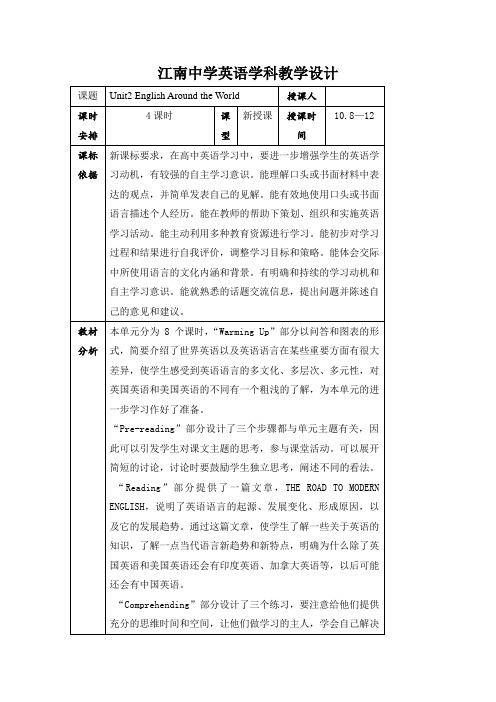
江南中学英语学科教学设计品味人生1、不管鸟的翅膀多么完美,如果不凭借空气,鸟就永远飞不到高空。
想象力是翅膀,客观实际是空气,只有两方面紧密结合,才能取得显着成绩。
2、想停下来深情地沉湎一番,怎奈行驶的船却没有铁锚;想回过头去重温旧梦,怎奈身后早已没有了归途。
因为时间的钟摆一刻也不曾停顿过,所以生命便赋予我们将在汹涌的大潮之中不停地颠簸。
3、真正痛苦的人,却在笑脸的背后,流着别人无法知道的眼泪,生活中我们笑得比谁都开心,可是当所有的人潮散去的时候,我们比谁都落寂。
4、温暖是飘飘洒洒的春雨;温暖是写在脸上的笑影;温暖是义无反顾的响应;温暖是一丝不苟的配合。
5、幸福,是一种人生的感悟,一种个人的体验。
也许,幸福是你风尘仆仆走进家门时亲切的笑脸;也许,幸福是你卧病床上百无聊赖时温馨的问候;也许,幸福是你屡遭挫折心灰意冷时劝慰的话语;也许,幸福是你历经艰辛获得成功时赞赏的掌声。
关键的是,你要有一副热爱生活的心肠,要有一个积极奋进的目标,要有一种矢志不渝的追求。
这样,你才能感受到幸福。
6、母爱是迷惘时苦口婆心的规劝;母爱是远行时一声殷切的叮咛;母爱是孤苦无助时慈祥的微笑。
7、淡淡素笺,浓浓墨韵,典雅的文字,浸染尘世情怀;悠悠岁月,袅袅茶香,别致的杯盏,盛满诗样芳华;云淡风轻,捧茗品文,灵动的音符,吟唱温馨暖语;春花秋月,红尘阡陌,放飞的思绪,漫过四季如歌。
读一段美文,品一盏香茗,听一曲琴音,拾一抹心情。
8、尘缘飞花,人去楼空,梦里花落为谁痛?顾眸流盼,几许痴缠。
把自己揉入了轮回里,忆起,在曾相逢的梦里;别离,在泪眼迷朦的花落间;心碎,在指尖的苍白中;淡落,在亘古的残梦中。
在夜莺凄凉的叹息里,让片片细腻的柔情,哽咽失语在暗夜的诗句里。
9、用不朽的“人”字支撑起来的美好风景,既有“虽体解吾犹未变兮”的执着吟哦,也有“我辈岂是蓬蒿人”的跌宕胸怀;既有“我以我血荐轩辕”的崇高追求,也有“敢教日月换新天”的豪放气魄。
高一英语 Unit2 English around the world上课学习上课学习教案

高一英语 Unit2 English around theworld教案高一英语Unit2Englisharoundtheworld教案Unit2Englisharoundtheworld第二课时(Pre-reading----reading知识点)学习目标:1.掌握重点词汇的用法2.能够灵活运用新句型重难点:能够灵活运用新词汇及句型学习过程:一、知识探究….andbecauseofthat,Englishbegantobespokeninman yothercountries.e.g.①Tellyourfriendsaboutthechangesoftheplanbecauseofyou rillness.②Theyareherebecauseofus.③westayedathomebecauseitrained.④Hewaspunishedjustbecauseofwhathehadsaid.自主探究①becauseof“因为;由于”,是短语,其后可接,动名词或由what引导的从句,在句中作状语。
②because“因为;由于”,是,后接。
练习①他们为了孩子而搬家到这里。
Theymovedhere__________thebaby.②因为下雨,所以我回来了。
Icameback____________therain.③我们这么做因为我们觉得这是我们的职责。
wedidit___________wefeltitourduty.2.I’dliketocomeuptoyourapartment.猜测下列句子中comeup的词义。
①Thelittlebycameuptothestrangerandshowedhimhowtogett othepolicestation.②wewon’tforgetthedaywhenwewatchedthesuncomeupontopoftheTai mountain.③Itiscertainthatthequestionwillcomeupatthemeeting.④Thesnowdropsarejustbeginningtocomeup._⑤Iamafraidsomethingurgenthascomeup.____短语归纳come邂逅come向…扑来,攻击come来自come出版;开花;结果是come想出,发现,提出come发生come绕道而来come落下,塌下指点迷津comeup/comeupwith①comeup意为“被提及”时,其主语是被提出的内容,不能用于被动语态。
高一上UNIT2说课教案
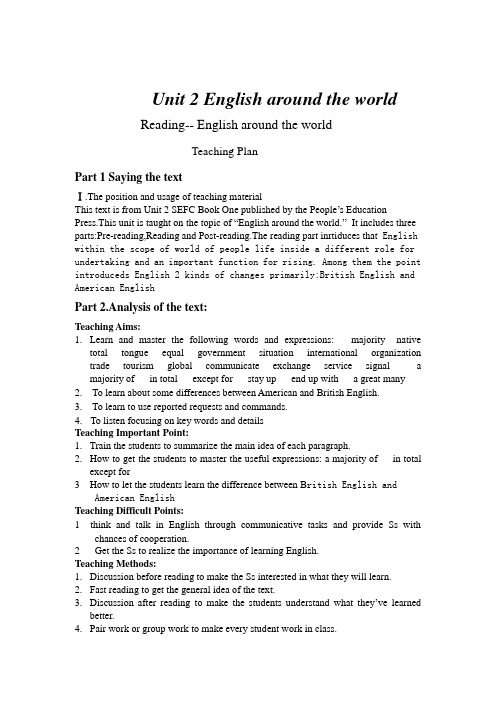
Unit 2 English around the worldReading-- English around the worldTeaching PlanPart 1 Saying the textⅠ.The position and usage of teaching materialThis text is from Unit 2 SEFC Book One published by the People’s Education Press.This unit is taught on the topic of “English around the world.”It includes three parts:Pre-reading,Reading and Post-reading.The reading part inrtiduces that English within the scope of world of people life inside a different role for undertaking and an important function for rising. Among them the point introduceds English 2 kinds of changes primarily:British English and American EnglishPart 2.Analysis of the text:Teaching Aims:1.Learn and master the following words and expressions: majority nativetotal tongue equal government situation international organization trade tourism global communicate exchange service signal a majority of in total except for stay up end up with a great many2. To learn about some differences between American and British English.3. To learn to use reported requests and commands.4.To listen focusing on key words and detailsTeaching Important Point:1.Train the students to summarize the main idea of each paragraph.2.How to get the students to master the useful expressions: a majority of in totalexcept for3 How to let the students learn the difference between B ritish English andAmerican EnglishTeaching Difficult Points:1 think and talk in English through communicative tasks and provide Ss withchances of cooperation.2 Get the Ss to realize the importance of learning English.Teaching Methods:1.Discussion before reading to make the Ss interested in what they will learn.2.Fast reading to get the general idea of the text.3.Discussion after reading to make the students understand what they’ve learnedbetter.4.Pair work or group work to make every student work in class.Teaching Aids:1.the multimedia2. a tape recorder3.the blackboardPart 3 Saying the students:The Ss in our High School are all country Ss.Their foundation is worse, the study is passive, lack the study habit, but the plasticity is stronger and they have rich imagination and a little experience of life,the can solve some problems by themselves.Part 3 Teaching ProceduresStep1 Lead-in2.Ask Ss to work in small groups of four,discuss and fill in group members’language profile .Ask them to discuss in what situations they use the foreign languages.(e.g. listening to pop songs, accessing software and web sites, chat rooms, reading packages of products, etc)3 Ask some groups to report.4. Introduce some terms : mother tongue, native speak,Step2 While-reading1. SkimmingAsk Ss to read through the passage and summarize the main idea of each paragraph. Para 1 More than 750 million people speak English as their native language or a second language.Para 2 More than 750 million people learn English as a foreign language.Para 3 English is the working language of most international organization,trade and tourism.2. Scanning(1) Ask Ss listen to the tape and fill in the form(2) Ask Ss to work in pairs to discuss(3)Check the answerStep 3. Carefully reading(1)Explain some words and expressions.majority: the largest number/biggest part of something.the Phillipines: is a plural and has a definite article because it is a group of islands.Mother tongue: I think the two words together form a noun,because you can say that English is the mother tongue for very many people.As the sentence starts with In total it probabhy gives a conclusion of what was said in the two sentences before,so probabhy the meaning of mother tongue is the same as native countries International: the word is an adjective.After looking it up in the dictionary,I understand that inter-,just as in the word internet means between,and nation means country.International means between countries.Organizations:there it says that means something like a group or club,ir business and if it is international that it can be found in different countries or people from different countries can be part of it .Communicate: In the sentence and also further down it says that we use English to do something(communicate) with people.From the dictionary I learnt that is means to share information with other people by speaking,writing or using body language.(2) Analyze some complex sentencesA …except for those in Hong Kong ,where many people speak English as a first or asecond language.except多用于引起同类事物中被排除的一项e.g. He answered all the questions except the last one.We go there every day except Sunday.except fo r 用于引述细节以修正句子的主要意思e.g. Except for one old lady,the bus was empty.Your picture is good except for some of the colours.B With so many people communicating in English every day,it wil become moreand more important to have a good knowledge of English.动词-ing形式用作状语时,其逻辑主语一般应与句子的主语一致。
最新新人教版英语高一年级上册module 1《unit 2 english around the world》教案一.doc
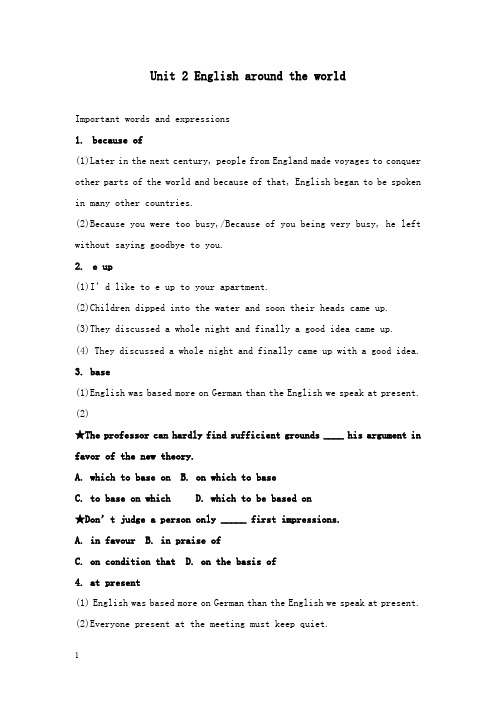
Unit 2 English around the worldImportant words and expressions1.because of(1)Later in the next century, people from England made voyages to conquer other parts of the world and because of that, English began to be spoken in many other countries.(2)Because you were too busy,/Because of you being very busy, he left without saying goodbye to you.2. e up(1)I’d like to e up to your apartment.(2)Children dipped into the water and soon their heads came up.(3)They discussed a whole night and finally a good idea came up.(4) They discussed a whole night and finally came up with a good idea.3. base(1)English was based more on German than the English we speak at present.(2)★The professor can hardly find sufficient grounds ____ his argument in favor of the new theory.A. which to base onB. on which to baseC. to base on whichD. which to be based on★Don’t judge a person only _____ first impressions.A. in favourB. in praise ofC. on condition thatD. on the basis of4. at present(1) English was based more on German than the English we speak at present.(2)Everyone present at the meeting must keep quiet.★She ____ her idea for a new production at the last sales meeting.A. furnishedB. equippedC. presentedD. raised★Those _____ at my birthday party, please arrive at seven o’clock.A. presentB. interestedC. absentD. amused5. make use ofShakepears was able to make use of a wider vocabulary than ever before.★ It’s no ___ arguing with Bill because he will never change his mind. A. use B. help C. time D. way★The machine, ____ I think ____ to our daily life, was invented by somecollege students.A. which; of useB. which; is of useC. that; it is usefulD. it is useful★The temple we used _____ during our childhood was pulled down.A. to visitingB. to visitC. for visitingD. for a visit★ Little use they make _____ time to practice English shows they arevery busy. A. of B. for C. on D. to6. latter(1)The latter gave a separate identity to American English spelling.(2)A moment later, another plane appeared in the sky.(3)You’ll have to stay outdoors if you e late again.(4)Where have you been lately?★She used to dress in the ____ fashion. However, she has been wearingclothes out of date _____.A. later; latelyB. latest; latelyC. lately; lateD. late; later7. such asEnglish is also spoken in Singapore and Malaysia and other countries inAfrica such as South Africa.8. play a part (in)(1)Geography also plays a part in making dialects.(2)Who will play a part of Li Xiaolong in this film?9.recognizeAlthough many Americans move a lot, they still recognize and understand each other’s dialects.10mand11. request12. straight(1)Walk along a straight line.(2)Well, go round the corner on your left-hand side, straight on and cross two streets.13.acturallyActurally all languages change and develop when cultures meet and municate with each other.Warming upIn some important ways they are very different from one another. Reading(1)Later in the next century, people from England made voyages to conquerother parts of the world and because of that, English began to be spoken in many other countries.(2)So why has English changed over time?(3) English was based more o n German than the English we speak at present.(4) So by the 1600’s Shakepears was able to make use of a wider vocabulary than ever before.(5)For example, India has a very large number of fluent English speakers…(6)Today the number of people learning English in China is incresingrapidly.★The number of people invited ____ fifty. But a number of them ____ absent for different reasons.A. were; wasB. was; wasC. was; wereD. were; wasUsing language(1)Believe it or not, there is no such thing as standard English.(2)This is because in the early days of radio, those who reported thenews were expected to speak excellent English.Unit Two1.because of / becauseA.He didn’t go to school because of his illness.B.He didn’t go to school because He was ill.C.He didn’t catch the train on time ______ the bad whether.D.He didn’t catch the train on time ______ it was raining heavily.2.native adj. / n.A.We are native speakers of Chinese and we are natives of China.B.Banana is native to Taiwan.C.one’s native language/ one’s mother tongue3.e up/ e up with ( put forward )A.A good suggestion came up at the meeting.B.They came up a good suggestion at the meeting.C.The boy came up and said “Nice to meet you here.”D.The seeds have e up.E.The sun es up in the east and sets down in the west.4. base n. / v.base …..on/upon be based on/upon 以…….为依据/根据base….in/at be based in/at 把……设在……A.We’ll make it the base for our revolutionary work.B.Judgment should be based on facts.C.The play is based on a true story.D.They have decided to base their new pany in Beijing.5. at present ( for the present at the moment now )A.He will give me a present. (n.)B.He is helping out in a bookstore at present. (n.)C.The present government leaders were all present at the meeting.(adj.)6. make ( good / full ) use ofmake the best of 尽量利用 make the most of 充分利用We must make full use of our spare time to practice speaking English.7. latterA.Of Math and English, I prefer the latter.B.Our teacher gave us two examples in class. The former was easy, thelatter was a bit difficult.8. fluentA.He is very fluent in speaking English.B.He speaks English very fluently.9. such as such … as for exampleA.He can speak six languages, such as Chinese, English and French.B.He can speak such languages as Chinese, English etc.C.Some students, for example Henry, have a large vocabulary of Englishwords.10. mand n./v. give a mand obey one’s mandshave a good mand of 精通/掌握……under one’s mand 由……命令/统帅/指挥mand sb. to do sth. mand that—clauseA.The policemen manded them to go out of the building.B.The policemen manded that they should go out of the building.C.He has a good mand of six foreign languages.11. reguest n./v.make a reguest (to sb.) for sth.request sth. of/from sb. 向……请求/要求某物by request at one’s request /at the request of sb.应…要求/依照请求/应邀request sb. to do sth. request that-clauseA.They made a request to the boss for a higher pay and better workingconditions.B.They requested a higher pay and better working conditions from theboss.C.The boss improved the working conditions at the request of the workers.D.The teacher requested us to finish our homework on time.E.The teacher requested we should finish our homework on time.12. play a part/role inA.We women are playing a more important part (role) in society nowB.She said she wanted to play the leading part/role in the movie. Thatis, she wanted to play the part of Liu Hulan.13. recognize 辨认出/听出/承认recognize …… as…. be recognized as…….recognize sb. to be recognize that……A.She changed so much that I didn’t recognized her at first sight.B.Sorry, I can’t recognize your voice on the phone.C.We all recognize him as a hard-working student.D.We all recognize that he is a hard-working student.14. straight adv./adj.A.Go straight down the road and you will find the market at the secondcrossing.B.Straight trees are used widely; straight persons have more friends.(树直用处多,人直朋友多)go straight 直走 straight away/off 立刻/马上Warming up1.more thanA.More than one person has heard of it.B.More people than one have heard of it.C.We are more than surprised to find him caught by the police.D.The job is more than he can do. (是…所不能的)E.Zhang Fei is more brave than wise.2.in some important ways3.be different from be similar to4.in a team/on a teamSome students in our class are in /on the school football team.e English as an official language (an official letter) Reading------The road to modern English1.nearly/ almost 几乎、差不多 (almost 与no one, nobody, none,nothing, nowhere, never连用),not…nearly 意为“远非”A.Nearly all the students/ everyone will lend a helping hand to othersin trouble.B.Almost none of them has/have reached the Great Wall.C.There isn’t nearly enough rain in some parts.2. make voyages 航行/航海 go on a voyage 进行航行3. speak English as a foreign language4. than ever before I will work harder than ever before.5. even if /even thougheven so(即使这样) even now/then(即使/甚至现在/那时)A.Even if he failed, he didn’t lose heart.B.They won’t end their friendship even if their classmates gossip.though, although, whatever, whoever, which, however, wherever, whenever, whether…or… etc. 均可引导让步状语从句。
高一英语教案:上学期Unit 2D

人教修订版英语高一上Unit 2 English Around the WorldReading教案American English And British EnglishI. Teaching aids: CAI, Multi-Media, tape-recorder.II. Teaching aims:1.To train the Ss ’ skills in listening, speaking, reading and writing.2.To learn some useful words and expressions of the text.3. Learn the text to get the students to know about the differences between American English and British English.III. Teaching important points:1. Improve the Ss ’ reading ability by reading the material.2. Improve the Ss’ listening ability.3.Get the Ss to know about American English and British English.IV.Teaching methods:1. Fast-reading and intensive reading to improve the Ss’ reading ability.2.Pair work and group work to have every student master what they’ve learned.V.Teaching procedures:Step 1. Greeting and lead-in: Array Array Greet the whole class as usual.In this period, we’ll learn a text,which is about American English andBritish English.Now look at the pictures(showing the slides).Can you tell me where the famousplaces are and the names of them?(The picture on the left is Statue of Liberty, which stands high up on the Liberty Island near New York seaport. It is the symbol of American people who long for the freedom. On the right the picture is Big Ben, which is the great clock high up in a tower of the Parliament building. This isthe building in London where laws are made.)Do you know which language people speak in America?(English)How about people in England? (English)All right. People in both two countries speak the same language. However, do you know there are some differences between the two languages? Can you tell me what you have known? And what you want to know?Now look at another two pictures. What can you see in the pictures? (Two persons are talking).Can you guess which of the two persons comes from America? (The person on the left)Step 2. Warm-up reading:Now let me introduce the history of the English language to you. English is a young language. It grew from other languages, such as German and French. People began to write it down only six hundred years ago. Now it is spoken by people all over the world. From last period we know there are more than 42 countries where the majority of people speak English. There are two main families of standard English: the American and the British English. American English is spoken in the USA and in Canada. British English is spoken in Britain, Australia and Africa. However, English is not exactly the same in different countries. Today, we are going to learn about the differences between American English and British English. Now let’s listen to the tape and find the answers to the questions on the screen (showing the slides).Answer the following questions:1. What is American English for “I think”?(In American English “I guess” is used instead of “I think”)2. What did Noah Webster do in order to make American English different from BritishEnglish?(He changed the spelling of many words.)Step 3. Fast-reading comprehension:Do fast reading silently, and then choose the best answer.1.America stopped being a part of England in _____.A. 1707B.1828C.1776D.19112.Which of the following statements is true?A.After 1828 American English and British English stayed the same.B.After 1828 American English changed but British English stayed the same.C.After 1828 British English changed but American English stayed the same.D.After 1828 both British English and American English changed.3.British English is different from American English because_____.A.Britain decided to change the spelling of many American wordsB.American English changed but British English stayed the same.C.The Americans and British took different words from other languages.D.America is a bigger country.4.Noah Webster was _____.A.an American presidentB. a Spanish farmerC. a British teacherD.an American writer5.Which of the following statements is trueA.In the future both American English and British English will stay the same.B.In the future American English will change but British English will not.C.In the future British English will change but American English will not.D.In the future both British English and American English will change.(Answers: 1-5 C D C D D )Step 4.Intensive reading:Now read the text again. Read it carefully and discuss the following questions on the screen with your partners. Find your answers on your book. In a few minutes, I’ll as k some pairs to give us the answers (showing the screen).Answer the following questions:1.When did America become an independent country?(In 1776)2.Where did the word “fall” (meaning “autumn”) first come from?(From England).3.Can you give some example to show spelling differences between American and British English?(For example, the words “colour, centre and travelled” in British English are spelt “color, center and traveled” in American English.)4.Is there any differences in written English in the two countries?(Yes. In written English there are some spelling differences between British English and American English. And in some cases, different words are used for the same thing.)5.What differences are there in spoken English in the two countries?(Some words are pronounced differently in the two countries. For example, Americans say dance [dæns], and in southern England they say [dα:s]. In America, they pronounce not [nαt ]; in southern England, they say [not], and so on.)6.Do you think that people from Britain and America can understand each other? Why do you think so?(Yes. Though there are many spelling differences, they can understand each other because written English is more or less the same in both Britain and America. )7.How did the differences come about?(There is no quick answer to this question. At first the language in Britain and America was the same. After America became an independent country, the language slowly began to change. For a long time, the language in America stayed the same, while the language in England changed.)8.Which do you like, American English or British English? Why?(I prefer American English to British English because American English is easier to understand. / I prefer British English to American English because British English sounds more beautiful.)Step 5. Language points and key sentences:Deal with some Language points and key sentences in the text.e about = happene.g.How did this accident come about?They didn’t know how the change had come about?Sometimes it is hard to tell how a quarrel comes about.2.stay = keep. Here “stay” is a link-v. followed by an adj.e.g.The shop stayed open till nine o’clock.The temperature has stayed high this week.3.just as + adverbial-clause.e.g.She loves singing just as her mother did.Jack didn’t feel just as his wife did.4.end up with = finish withe.g.The party ended up with the singing of Liu Huan.The lecture ended up with a poem.5.more or less = nearly, almoste.g.The work is more or less finished.Our working condition has more or less improved.6.have difficulty / trouble in doing sth.have difficulty / trouble with sth.e.g.I have some difficulty in understanding the text.He had no difficulty with the job.Step 6. Reading and writing:Now look at Reading and Writing on Page 13. Read the Paragraph about American English and fill in the chart. Then check the answers.Suggested answers:Step 7. Summary:Sum up the key points briefly and enable the Ss to master what we’ve learned today. In this class, we’ve learned the differences between American English and British. Now let’s sum them up.Step 8. Homework:1.Write a short passage, comparing American and British English.2.Write a letter in the name of Wang Ling to Mr. Smith on P96.。
人教版高中英语必修第一册 《Unit 2:English around the World》教案

人教版高中英语必修第一册 《Unit 2:English around the World》教案一、教学目标1.知识目标o学生能够掌握与英语在世界各地的发展和差异相关的重点词汇和短语,如 “official, voyage, native, actually, base” 等。
o学生能够理解并运用描述英语在不同地区特点和变化的句型。
2.技能目标o学生能够听懂有关英语在全球使用情况的对话和讲座,并提取关键信息。
o学生能够阅读并理解介绍英语在世界各地演变的文章。
o学生能够用英语简单比较和阐述不同地区英语的特点。
o学生能够就英语的全球化影响进行讨论和书面表达。
3.情感目标o培养学生对英语语言多样性的认识和尊重。
o激发学生学习英语的兴趣和动力,了解其作为全球通用语言的重要性。
二、教学重难点1.教学重点o重点词汇和短语的准确理解与运用。
o课文中关于英语在世界各地发展和变化的内容理解。
o引导学生用英语描述不同地区英语的差异。
2.教学难点o帮助学生理解英语语言变体背后的文化和历史原因。
o培养学生在讨论和写作中清晰表达对英语全球化的观点。
三、教学方法1.对比分析法:对比不同地区英语的特点,加深学生的理解。
2.案例教学法:通过具体实例,讲解英语的变化和差异。
3.小组合作法:组织学生分组讨论,共同探究问题。
四、教学过程(一)导入(5 分钟)1.展示不同国家或地区人们说英语的视频片段。
2.提问学生:Did you notice any differences in the way they speak English?(二)词汇教学(10 分钟)1.呈现本单元的重点词汇和短语,结合具体语境进行讲解。
2.通过词汇游戏,如词汇配对、猜词义等,巩固词汇记忆。
(三)阅读前准备(5 分钟)1.让学生观察课文标题和图片,预测文章的主要内容。
2.提出引导性问题,如:What do you think the passage will talk about English around the world?(四)课文阅读(15 分钟)1.学生快速阅读课文,概括文章的主旨大意。
- 1、下载文档前请自行甄别文档内容的完整性,平台不提供额外的编辑、内容补充、找答案等附加服务。
- 2、"仅部分预览"的文档,不可在线预览部分如存在完整性等问题,可反馈申请退款(可完整预览的文档不适用该条件!)。
- 3、如文档侵犯您的权益,请联系客服反馈,我们会尽快为您处理(人工客服工作时间:9:00-18:30)。
高一英语上学期教案Unit 2 English around the world Reading李佳一、教材分析1、单元背景分析本单元讨论的话题是“世界英语”介绍了英语在当今世界范围内人们生活中扮演的不同角色及其重要意义。
尤其介绍了英美语言的差异,让学生更进一步了解学好英语的必要性和其重要意义。
促使学生了解英美语言在词汇、拼写、语音等方面的区别。
使学生在认识到学好英语的重要性的同时,更加热爱自己的祖国,从而培养他们的祖国意识。
2、教材内容分析本课是高中一年级英语上册,unit 2 English around the world 中的Reading.本单元的中心话题是“世界英语”,具体涉及“英语在当今世界范围内人们生活中扮演的不同角色及其重要意义,以及英美语言的差异”。
本课的语言知识及语言技能主要是围绕“世界英语”这一中心话题进行设计的。
本课时主要分为两部分:1)Pre-reading.“ 读前准备”部分是Reading的前奏,此部分设计了两个问题,诱发学思考。
通过对问题的讨论和比较,让学生明白学好英语的重要性。
2)Reading“阅读”部分文体为说明文,全文共分三个段落。
全文阐述了一个鲜明的观点:英语的确是当今世界范围内使用最广泛的一门语言之一,也是联合国的工作语言之一,它的重要作用是其他语言不可替代的。
3)Post-reading“读后”部分共设计了两类题型:第一部分是和个问题,其中前面两个是细节理解题;第三题是一个开放性题目,鼓励学生把英语学习与现实生活相结合。
第二部分是填空形式,帮助学生梳理文章,掌握文章主要细节,概括中心思想,实为文章的一个纲要。
三部分均以提高学生阅读能力为主,所以将此三部分有科学地整合成一节阅读课。
3、教学重点1)、使学生在认识学好英语的重要性的同时,更加热爱自己的祖国。
2)、发展学生的阅读能力,尤其是归纳总结,猜词和查读(scanning)的能力。
3)、使学生通过交际性任务和合作的机会,培养他们用谚语思维和交际的能力。
4、教学难点1)、使学生在认识到学好英语的重要性的同时,更加热爱自己的祖国,从而培养他们的祖国意识。
2)、与同伴一起讨论并找到解决问题的方法。
5、教学目标根据课文特点及新课标对高一年级学生英语学习能力的要求,本课的教学目标我定为以下几方面:一、语言目标,二、情感目标。
1. 语言目标本课为阅读课型,是一篇说明文,涉及了英语在当今世界范围内人们生活中扮演的不同角色及其重要意义。
尤其介绍了英美英语语言的差异。
通过阅读使学生了解“世界英语”的一些基本概况,包括它的重要性和英美英语的差异。
教师根据课文内容用不同的形式来训练学生,提高阅读技能。
由于课文讲述的是世界英语的话题,学生会感兴趣。
为了引起共鸣,可把课文与生活中经历结合一起讨论。
本课的目的是使学生提高听、说和阅读能力,更深的了解学好英语的重要意义。
从而激发学生学习英语的兴趣。
2. 情感目标让学生领会英美不同文化差异和风俗习惯,领会语言丰富多彩性和发展变化的特征,使学生在认识世界英语在人们生活中扮演的不同角色的同时,更加热爱自己的祖国,从而培养他们的祖国意识。
培养他们的跨国文化意识和世界意识。
二、说教法教学环环相扣,设计紧凑。
先利用学生感兴趣的话题引起兴趣,然后带着问题有目的地阅读文章。
通过回答问题掌握细节,理清线索,再从整体上把握它的结构、特色,学习用英语归纳以及复述,最后以拓展课文知识小组活动完成这节课的整体教学。
使他们掌握阅读技巧的同时也增加了见识。
在小组讨论过程中,学会用已学词、句表达出自己的观点。
学生通过体验、实践、讨论、合作和探究等方式,发展听、说、读、写的综合语言技能。
为了能很好地突出重点,突破难点,圆满完成教学任务,取得良好的教学效果,我抓住重点,联系实际,以学生为主体,教师为主导,让学生集中练习。
为了激发学生的兴趣愉快地学,我采用限时阅读、快速阅读、判断正误等教学方法,让学生充分体现课堂教学“主体者”的身份。
三、说教学程序1、导入:首先在学生对英语是世界上最广泛使用的语言和越来越多的人在学习英语现有情况了解的基础上,引出问题“Do you know how many countries use English as their mother tongue?Do you know something about English around the world?”在学生思索时,引出课题English around the world。
接着再询问学生:What language has the largest number of speakers in the world? What language is the most widely spoken and used in the world? How many countries do you know use English as theirmother tongue?使学生对本节课的话题有进一步了解,而且很有兴趣了解“世界英语”的具体情况。
从另一个角度,先给学生一个语言上的input。
激发学生的兴趣和欲望.2、Pre-reading:在学生回答了以上问题后,我让学生看这一部分课本上所设的两个问题:1) How many languages do you speak? Which is your native language? 2) If you speak more than one language, in what situation do you use the languages?让学生仔细思考后回答。
教师不必忙着下结论,诱导他们从书中去思考寻找答案,激发他们探究的兴趣。
3、Reading:使学生了解英语在当今世界范围内人们生活中扮演的不同角色及其重要意义。
任务1:Listen to the tape ,听录音,然后让学生尽力得出大意并且回答问题1. How many countries are there where the majority of people speak English?2. How is English used in Hong Kong?3. What language should we use on the Internet so that we can communicate with people around the world ?任务2:让学生带着问题阅读课文(scanning)。
有目的性阅读是阅读训练一种技巧,并且提醒学生不用太多花大多注意力在地名和新单词上面,集中精力探究文章内容。
阅读后学生给出答案(教师不要袖手旁观,可以给学生必要的引导和帮助,发展学生的自主学习能力,真正的成为学习的主体。
)任务3:根据课文内容,判断句子对与错。
1、There are more than 42 countries where the majority of the people speak English in the world.()2、There are more than 37,500,000 people who learn English as a second language.()3、New Zealand, South Africa, the Republic of Ireland and the Philippines use English as their mother tongue.()4、More than 750,000,000 people learn English as a foreign language.()5、English is the only one working language of most international organizational trade and tourism.( )(此设计是为了检查学生是否理解文章大意和一些重点细节。
)任务4:根据课文内容,完成以下五道阅读理解题。
1.According to the text, which is TRUE about those who use English as a second language?()A. English is also their mother tongue.B. They use more than two official languages in their country.C. People enjoy talking to their family members at home in their native language.D. They learn English at high school for about five years.2、What’s the situation of English used in China?()A. Most Chinese students learn English at school as a foreign language.B. All Chinese students speak English as a foreign language.C. The majority of Chinese students speak English at school as a second language.D. The majority of people in Hong Kong use English as their mother language.3、What’s the main idea of the passage?()A. There are more than 42 countries where th majority of the people speak English in the world.B. More than 750 million people learn English as a foreign language.C. English is the language of global culture such as popular music and the Internet.D. English is the language which is the most important and widely used in the world today.4、Which is right according to the text?()A. Native speakers of English might find it unnecessary for them to learn a foreign language.B. English will be the only English to be used in the future.C. English is the working language of most international organizations, international trade and tourism.D. With the development of China’s economy, Chinese will be more and more important than English.5、Which is WRONG to answer the following questions. Why is it becoming more and more important to have a good knowledge of English? ()A. More and more people will become interested in English.B.English is one of the working languages of most international organizations, international trade and tourism.C. We can communicate with people around the world everywhere through the Internet by using English.D.English has developed into the language most widely spoken and used in the world.(这活动帮助学生梳理文章,掌握文章主要细节,概括中心思想。
